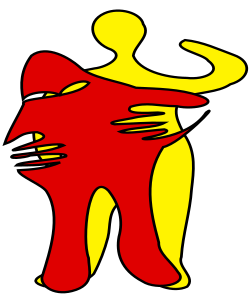As you see below, low self esteem, shame, and guilt are some of the symptoms of what is often referred to as codependency. Codependency is like a dance — an insecure dance, not quite sure when you’ll step on the other’s foot or be stepped on.
SOME SYMPTOMS OF CODEPENDENCY ARE:
- Low self-esteem or self-worth – low confidence, lack of assertiveness, defining yourself by someone else’s view of you
- Poor self identity
- not feeling whole, body (inaccurate view of self, feeling disconnected, preoccupied),
- thinking (confusion, unclear, trouble communicating thoughts),
- feelings (difficulty identifying or expressing, taking on feelings of someone else),
- behavior (difficulty controlling own behavior and the impact it has on others)
- Shame – shame comes from an internal source (e.g. feeling not good enough), guilt from an external source. I highly recommend an excellent, easy to read article about shame at https://psychcentral.com/lib/shame-the-core-of-addiction-and-codependency/
- Guilt when standing up for yourself, second guessing
- Overt or covert abuse – physical, sexual, emotional, intellectual, spiritual, financial https://kcounselingdenver.com/therapy-specialties-abuse-past-present/
- Fear of abandonment
- Attempting to fill a void with someone or something else
- Seeking approval from others even though you have an overdeveloped sense of responsibility
- Confusion over wants and needs
- Unhealthy internal and external boundaries
- Trying to rescue someone or feeling like a victim
- Acting mean to someone without knowing why
- Need to feel in control
- Patterns of compulsive use of substances, behaviors, or people
- Family of origin problems
You experience stress, anxiety, looking over your shoulder to see if you have met perceived expectations, and the need for approval rather than a life of freedom and joy in being who you are meant to be. https://kcounselingdenver.com/when-you-hurt-blog/
These symptoms usually develop over a period of time, most often with their origins in childhood. As we grow through childhood and adolescence – depending on our environment (family, school, friends, religious influences ) – the unhealthy aspects of self identification has the potential for becoming more and more ingrained in who we view ourselves. It is not a forgone conclusion that an unhealthy environment will produce these symptoms, but it is more likely. In addition, what we have modeled for us, particularly by our caregivers, has a huge impact in how we view ourselves and our world.
DEPENDENCY VS CODEPENDENCY
Being dependent on one another is different from codependency.
People who are healthily dependent share each other’s joys and sorrows in a loving way, recognizing that each person is whole within him/herself. Each is able to make decisions, commitments, and choices independent of the other’s approval.
Dependency takes the other into account because together they have charted their course in life based on mutual love and respect.
ADDICTIONS ARE A FORM OF CODEPENDENCY
The need you feel to prop yourself up with something external, to dull or obliterate (usually emotional) pain, to fill the emptiness you feel, is at the heart of addiction.
These addictions can be to many different things, the most obvious being alcohol and drugs (street or prescription). Gambling, shopping, eating, hoarding, pornography, internet, social media, gaming, are all examples of possible addictions.
Of course, engaging in any of these activities occasionally doesn’t necessarily mean you’re addicted to them.
They are an addiction when:
- they rule your life
- you can’t stop yourself
- you’re dependent on them each and every day to cope
- you get angry and upset if others try to pull you away from the addiction or suggest it has overtaken your life.
Hypnotherapy is frequently and effectively used to treat codependency


